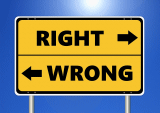
that addresses questions about morality
—that is, concepts such as good and evil, right and wrong, virtue
and vice
, justice
and crime
, etc.
Major branches of ethics include:
- Meta-ethicsMeta-ethicsIn philosophy, meta-ethics is the branch of ethics that seeks to understand the nature of ethical properties, statements, attitudes, and judgments. Meta-ethics is one of the three branches of ethics generally recognized by philosophers, the others being normative ethics and applied ethics. Ethical...
, about the theoretical meaning and reference of moral propositions and how their truth values (if any) may be determined; - Normative ethicsNormative ethicsNormative ethics is the study of ethical action. It is the branch of philosophical ethics that investigates the set of questions that arise when considering how one ought to act, morally speaking...
, about the practical means of determining a moral course of action; - Applied ethicsApplied ethicsApplied ethics is, in the words of Brenda Almond, co-founder of the Society for Applied Philosophy, "the philosophical examination, from a moral standpoint, of particular issues in private and public life that are matters of moral judgment"...
, about how moral outcomes can be achieved in specific situations; - Moral psychologyMoral psychologyMoral psychology is a field of study in both philosophy and psychology. Some use the term "moral psychology" relatively narrowly to refer to the study of moral development. However, others tend to use the term more broadly to include any topics at the intersection of ethics and psychology and...
, about how moral capacity or moral agency develops and what its nature is; - Descriptive ethicsDescriptive ethicsDescriptive ethics, also known as comparative ethics, is the study of people's beliefs about morality. It contrasts with prescriptive or normative ethics, which is the study of ethical theories that prescribe how people ought to act, and with meta-ethics, which is the study of what ethical terms...
, about what moral values people actually abide by.
Within each of these branches are many different schools of thought and still further sub-fields of study.
Meta-ethics is a field within ethics that seeks to understand the nature of normative ethics
.
Poetry is an ethic. By ethic I mean a secret code of behavior, a discipline constructed and conducted according to the capabilities of a man who rejects the falsifications of the categorical imperative.![]()
Strong ethics keep corporations healthy. Poor ethics make companies sick. Values are the immune system of every organisation. ![]()
There is good and there is Evil.Evil must be Punished.Even in the Face of Armageddon,I will not Compromise This![]()
One has a feeling that one has a kind of home in this timeless community of human beings that strive for truth. … I have always believed that Jesus meant by the Kingdom of God|Kingdom of God the small group scattered all through time of intellectually and ethically valuable people.![]()
Ethics, too, are nothing but reverence for life. That is what gives me the fundamental principle of morality, namely, that good consists in maintaining, promoting, and enhancing life, and that destroying, injuring, and limiting life are evil.![]()
Let me give you a definition of ethics: It is good to maintain and further life — it is bad to damage and destroy life. And this ethic, profound and universal, has the significance of a religion. It is religion.![]()
Ethics does not treat of the world. Ethics must be a condition of the world, like logic. Ethics and Aesthetics are one.![]()

